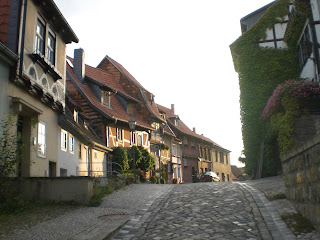I arrived in Quedlinburg in late afternoon and all the beds at the youth hostel were already gone, so I walked to the tourist information and booked a room in a bed & breakfast. After I checked-in there, I made a long walk through the city from the city hall to the Word Garden to the castle hill and back. As it was Monday most of the museums and restaurants were closed anyway, but finally I found an open spot: Cafe Roland that stretches over several houses.
 City Hall
City HallQuedlinburg belongs to the UNESCO World Heritage because of its 1300 still standing houses of wood frame-work construction. Since reunification more than two thirds of the houses have been restored and there are more people living in there houses than in modern ones.
The next morning, I went on a special tour about the first kings of Saxony (Germany) in 919. It was in the bird garden here in Quedlinburg where Henry I. was informed that he would be king (he was then coronated in Fritzlar). It's important to know that in those times the kings did not live steadily at the same place but travelled through the whole country for two reasons:
first, they brought order and arbitration to all the parts and reigned so the country and
second, none of the castles and surrounding counties were able to afford the kingly court for then three days with food.
There is saying that the arrival of the court is like a swarm of locusts (grasshoppers) and it's better to see them leaving then to see them coming.
When in town, the king lived in this castle, later his son wife transferred it into a community for women (Frauenstift). Here daughters of noble families were educated. In the abbey the women also prayed for the memory of king Henry and his followers. The abbey saw 39 abbesses before it was closed in 1802 by the German Mediatisation and Quedlinburg passed to the King of Prussia.







No comments:
Post a Comment